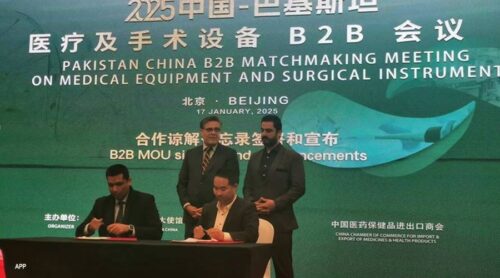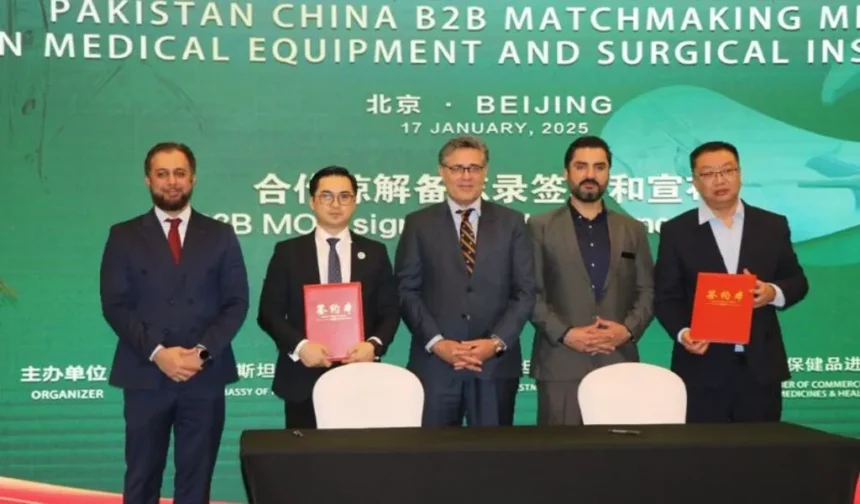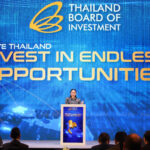The Associated Press of Pakistan (APP) reported on Saturday that Pakistani and Chinese enterprises have inked memorandums of understanding (MoUs) worth over $250 million to enhance commerce in the medical and surgical industry.
Pakistan enjoys robust bilateral ties with China, which has supported it through numerous investments and development initiatives, notably the China-Pakistan Economic Corridor project, referred to as a “lifeline” for the nation’s economy.
The MoUs were signed yesterday at a China-Pakistan B2B matchmaking conference in Beijing, focusing on the medical equipment and surgical tool sector.
According to China Economic Net (CEN), the Silk Road Assistance Industrial Internet Platform, which offers advisory services for companies engaged in cross-border trade, has signed Memorandums of Understanding (MoUs) with Pakistan’s dental and surgical instrument manufacturer, Sawuat, and the Chinese pharmaceutical firm UPH Biopharma.
According to CEN, the alliance intends to inspire more Chinese enterprises to set up joint ventures in the medical instrument sector.
Pakistan’s embassy in Beijing also stated yesterday that three MoUs totalling $250m were inked during the meeting.
In coordination with the Board of Investment (BOI), the embassy said it conducted the sixth moot in a series of sector-specific B2B matchmaking events focused on investment collaborations between Pakistan and China in the medical sector.
“Over 80 Chinese companies and associations and more than 20 Pakistani companies participated both in person and online,” it stated.
On the occasion, Pakistan’s ambassador to China, Khalil Hashmi, highlighted the enormous potential of the medical business in Pakistan, stating it was valued at over $600m.
According to the embassy, Hashmi announced that Pakistan will hold the 4th Health, Engineering, and Minerals Show (HEMS) in Lahore from 17-19 April 2025, emphasising surgical and medical devices.
According to CEN, the conference culminated in the first round of seven B2B activities organized since Prime Minister Shehbaz Sharif’s visit to China last June. The article added that another seven roadshows were in the pipeline and were anticipated to roll out from next month.
During PM Shehbaz’s visit, 32 MoUs were agreed upon to encourage trade and investment between the two countries.
In September 2024, Chinese corporations signed several MoUs with their Pakistani counterparts at a conference, where as many as 25 large Chinese firms expressed their profound interest in investing extensively in Pakistan.

Most recently, in December, Chinese and Pakistani officials signed MoUs for five projects in transport, health, energy and agriculture, with cooperation from the Sindh government. This happened days after a Chinese business delegation met with President Asif Ali Zardari in Karachi.
According to Sunny Yang, the chief technology officer of the Silk Road Assistance platform, Pakistan has a competitive advantage in attracting international investment due to its large market, tax incentives, and European standards.
“Collaborating with China can help advance its medical industry. Yang said, “While it excels in equipment and instruments, there is significant room for improvement in areas such as image documentation.”
“By joining forces, Chinese technology can help Pakistan build its own brand and climb the global value chain,” the politician said.
Meanwhile, Zhou Hui, chairman of the China Chamber of Commerce for Import and Export of Medicines and Health Products, praised Pakistan’s “abundant raw material resources and a large labour force”.
With significant strengths in medical consumables, such as surgical instruments, the demand for high-quality medical products is increasing.”
“Pakistani businesses interested in doing business with China should be aware of China’s medical device and medication restrictions. He stated that the Chamber will continue to provide consulting services to help Pakistani medical products enter the Chinese market.
Muhammad Shahbaz, president of the China-Pakistan Medical Association, said he was working on constructing a China-Pakistan friendship hospital in Islamabad and planning a joint medical technology park in Pakistan.
At the conference yesterday, CEN announced that his association has completed a deal with a technology firm in Hangzhou to participate in medical equipment trading, joint ventures, and technology transfer.

Salman Ahmad is known for his significant contributions to esteemed publications like the Times of India and the Express Tribune. Salman has carved a niche as a freelance journalist, combining thorough research with engaging reporting.














